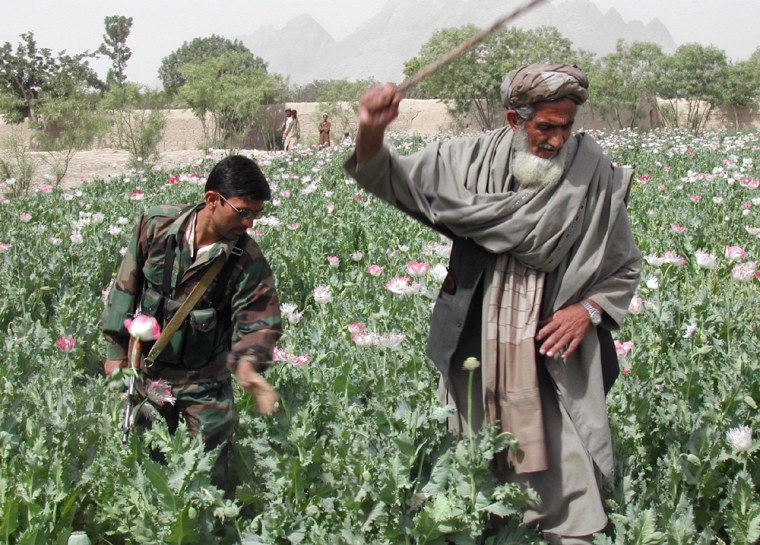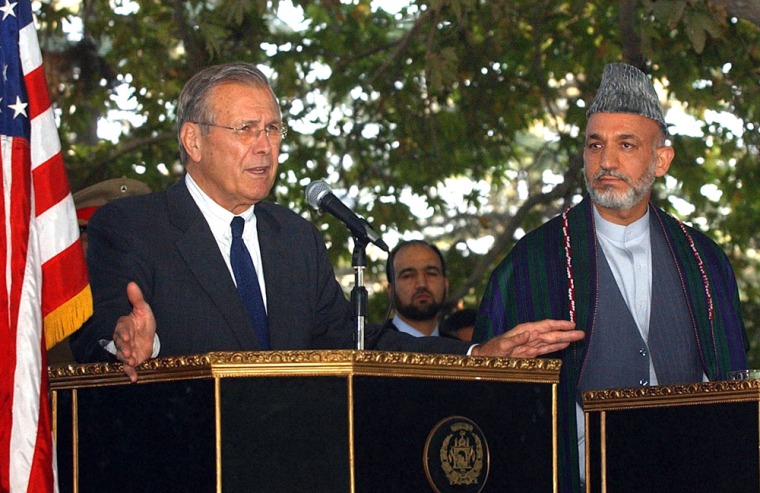Secretary of Defense Donald Rumsfeld reaffirmed the U.S. commitment to help pave the way for democracy in Afghanistan on Wednesday — lauding the country's efforts to register voters for the presidential election in October — but he also reiterated that Afghanistan must crack down on the illegal drug trade, saying it undermines any hope for stability.
En route to Kabul, Rumsfeld said U.S.-led coalition forces are preparing a coordinated effort to attack the narcotics trade in the country, noting that drug income could be used to fund insurgents and terrorists in the country.
"The danger a large drug trade poses in this country is too serious to ignore," Rumsfeld said. "The inevitable result is to corrupt the government and way of life, and that would be most unfortunate."
The cultivation of opium poppies has resumed and flourished in Afghanistan since the fall of the Taliban regime in 2001. It was largely eliminated under the Taliban's religious policing, but farmers have resumed cultivating and harvesting the profitable crop in the chaos since the end of the Taliban.
Afghanistan’s religious scholars have begun to deploy techniques that were successful for the Taliban and recently issued a fatwa, an Islamic decree, against poppy cultivation.
Uphill fight to recover humanity
In Afghanistan’s only mental hospital in Kabul, Said Ali, 36, stared at the ceiling of a dim room crammed with bodies stretched listlessly over 30 beds and reeking of tobacco and urine.
“I am here to recover my humanity,” said Ali.
A native of Uruzgan, a poppy hub and hotbed of anti-U.S. and coalition activity, he is just one of thousands of Afghans addicted to opiates.
He returned a year and a half ago from Iran, where he fled the protracted Afghan war seven years ago in hopes of a better life. He started eating, then smoking opium, in Iran to ease his pain from intensive labor in a stone-cutting factory there.
His plight epitomizes Afghanistan’s struggle to emerge successfully from the darkness of more than two decades of war, rather than revert to the chaos of a narco-Mafia state.
Bumper poppy crop
Afghanistan produced some 3,400 tons of opium in 2003, enough to make about 350 tons of heroin.
The area of cultivation has reportedly grown from around 4,000 acres in 2001 to more than 150,000 acres in 2003.

In July, the British Foreign Office said that this year’s crop is expected to be one of the largest on record. Robert Charles, the U.S. State Department's top counternarcotics official, also said Afghanistan may be on pace for a world record opium poppy crop this year.
Afghan President Hamid Karzai’s declared “holy war” on drugs is getting a great deal of support from the United States, Britain and the United Nations.
But despite the $180 million campaign that Britain launched for 2004-2005, and the more than $100 million spent by the United States over the last two years, Mirwais Yassini, Karzai’s counter narcotics chief, believes Afghanistan still needs a more aggressive program.
Need for stability ahead of elections
Yassini’s plan of attack entails training more specialized police, judicial reform, an increase in preventative and rehabilitative measures for drug users and encouraging farmers to grow alternative crops.
According to a study by the U.N. Office on Drugs and Crime, 69 percent of last year’s poppy farmers intend to expand their production, and 43 percent of farmers not cultivating poppy plan to do so in the coming year.
Programs to introduce substitute crops like fruits, saffron, sunflowers and olives are under way, but have yet to be effective because most are still at the stage of inception and need more funding to be implemented on a large scale, according to Yassini.
Yassini commended the British and U.S. efforts to train the Afghan counter narcotics force, which destroyed 32 poppy labs around the country from Badakhshan to Tora Bora since the beginning of this year. But he admitted that the force needs to be expanded to all of Afghanistan’s 34 provinces, which will clearly take time.
Time is one thing that Afghanistan may not have with presidential elections due on October 9, and parliamentary elections in April 2005.
“If we do not address drug traffickers and the warlord problem immediately, it will affect in a negative way the elections — particularly the parliamentary elections that will be sponsored by the drug czars, because they have unaccounted money, guns and power, and they can sabotage the elections or take it to the wrong destination,” said Yassini.
U.S. needs to get tougher and more involved
A Western diplomat involved with the training of the Afghan counter narcotics police, who spoke on condition of anonymity, believes that even though the United States has more extensive experience than the United Kingdom in fighting narcotics, it is not ready to take the kind of aggressive action in Afghanistan that it has taken in Colombia, for example.
The diplomat firmly believes that the drug problem and the disarmament of various militias is the main underlying problem that continues to undermine Afghanistan’s security, stability and reconstruction, thereby debilitating all preconditions for the main U.S. military objective: uprooting terrorism.
If NATO expansion beyond Kabul had been more expedient and the International Security Assistance Forces had worked as effectively throughout the country as they did in Kabul, “it would have helped a lot; I think there wouldn’t be such a large crop, less trafficking, and there would be more DDR,” said the diplomat, referring to disarmament, demobilization and reintegration of militias into society.
While the attacks on poppy labs and efforts to arrest high-profile suspects will continue, there is the question of whether to intensify the attack the narcotics now or wait until after the U.S. presidential election.
The diplomat pointed out that taking a tough stance on narcotics in Afghanistan can be difficult because it “isn’t warm and fuzzy like building schools — eradicating people’s crops is going to cause instability amongst the populace.”
Lives of regular Afghans hang in the balance
But while plans to launch an educational drug prevention campaign are under way, Yassini admitted that there still aren’t enough rehab centers to address the shattered lives of people like Said Ali.
Despite his empty stare, Ali is deeply determined to reach those better days he has longed for since he fled war-torn Afghanistan for Iran so many years ago.
Even though he knows most of this year’s bumper poppy crop has survived eradication, when asked, he says he firmly believes the war on poppy can be won. “Yes! If the government is a serious one, of course people will stop doing all illegal things.”
